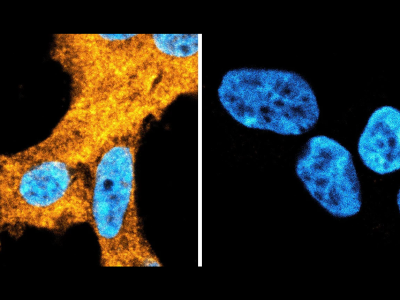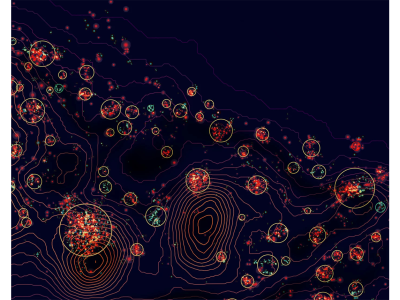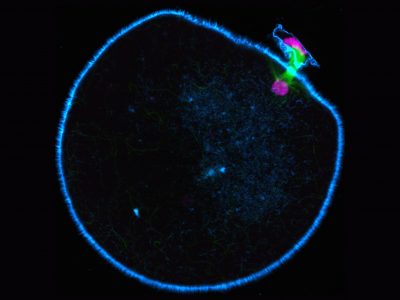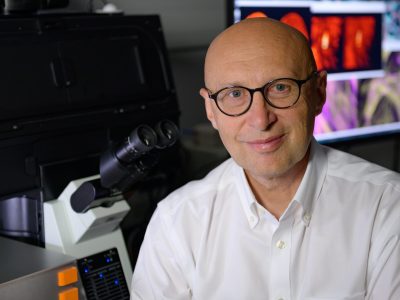02.05.2022
Possible biomarker for Parkinson’s discovered using new MRI method
Certain metabolic products are suitable as indication for Parkinson’s disease. Researchers and MBExC members at the Max Planck Institute (MPI) for Multidisciplinary Sciences, the University Medical Center Göttingen (UMG), and the German Center for Neurodegenerative Diseases (DZNE) have used this insight in a first step to develop a new diagnostics
27.04.2022
ERC Advanced Grant for MBExC member Claus Ropers
MBExC member Claus Ropers, professor at the Physics department at Göttingen University and director of the Department of Ultrafast Dynamics at the Max Planck Institute for Multidisciplinary Sciences, receives the prestigious Advanced Grant from the European Commission for his innovative research project. With the ERC funding, Ropers’ team wants to
26.04.2022
European funding for excellent research on hearing
MBExC speaker Tobias Moser, director of the Institute for Auditory Neuroscience at the University Medical Center Göttingen, received an ERC Advanced Grant. The European Research Council (ERC) supports his research project „Solving the dynamic range problem of hearing: deciphering and harnessing cochlear mechanisms of sound intensity coding (DynaHear)“ over five
14.04.2022
A new tool for optogenetics: human receptor for studying cell function with light
Scientists of the University Medical Center Göttingen identify the human OPN5 receptor as a new target to activate cells and to study the principles of how cells communicate with each other. Published on 1 April 2022 in the renowned journal Nature Communications. Link to the MBExC press release
28.03.2022
Sound to touch
A team of researchers led by Marcus Jeschke at the German Primate Center – Leibniz Institute for Primate Research (DPZ) and at the Institute for Auditory Neuroscience led by MBExC member Tobias Moser at the University Medical Center has developed an automated auditory training program that marmoset monkeys can perform
22.03.2022
Why some nerve cells have more to say
Nerve cells communicate via chemical neurotransmitters stored in small containers, termed synaptic vesicles. Some of these cells are more ‘articulate’ than others as they can send more than one type of messenger. By which mechanism such multilingual communication takes place, however, remained a puzzle. Researchers from the Max Planck Institute
11.02.2022
A missing ‘motor’ causes our eggs to fail
Human eggs often contain the wrong number of chromosomes, leading to miscarriages and infertility. A research team led by MBExC member Melina Schuh at the Max Planck Institute (MPI) for Multidisciplinary Sciences has discovered that human eggs are missing an important protein, which acts as a molecular motor. This motor
07.02.2022
How does too much interferon damage the brain of unborn children?
Researchers at the University Medical Center Göttingen (UMG), including MBExC members André Fischer, Jutta Gärtner, Peter Rehling and Christine Stadelmann-Nessler, have created the first animal model that can be used to study the damaging mechanisms of excessive interferon release on the brain. The results were published in the scientific open-access
01.02.2022
Stefan Hell receives Werner-von-Siemens-Ring 2022
This year, the Werner von Siemens Ring Foundation is honoring Max Planck researcher and MBExC member Stefan Hell for pioneering achievements in the technical sciences. The physicist and Nobel laureate succeeded in observing living cells at the molecular level using a new type of super-resolution microscopy. In addition to Hell,
12.01.2022
Doctoral award of the Berliner-Ungewitter foundation for Charlotta Lorenz
The MBExC congratulates Hertha Sponer College member Charlotta Lorenz for receiving the doctoral award of the Faculty of Physics at the University of Göttingen. The award, funded by the Berliner-Ungewitter Foundation, recognized her outstanding doctoral thesis on “Interactions within and between cytoskeletal systems” that she performed at the Institute of X-ray Physics under supervision











